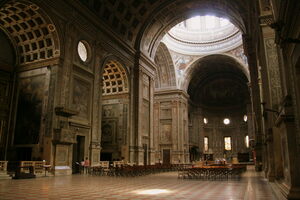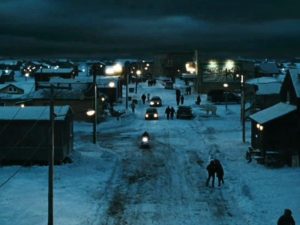
The Basilica di Sant’Andrea stands in Mantua’s historical center, overlooking the Piazza Mantegna. In the crypt are kept two reliquaries with earth soaked in the blood of Christ.
Christian tradition holds that while Jesus was being crucified, a Roman soldier named Longinus pierced his side with a lance. After Jesus died, Longinus repented for his sin and collected the blood-soaked soil from underneath the cross. That mix of blood and earth is now considered a holy relic, the Preziosissimo Sangue di Cristo (“Most Precious Blood of Christ”). Though stories vary, Longinus is said to have eventually made his way to Mantua, where the relic would eventually be housed in the Basilica di Sant’Andrea.
Construction began on the basilica in 1472. It was designed by Leon Battista Alberti, an Italian Renaissance humanist, architect, philosopher, and artist. The elaborate design featured an arch inspired by the Arch of Trajan, fluted Corinthian columns, and a vaulted roof. It took more than 300 years to build the basilica. The large dome that sits on top of the building was designed by Filippo Juvarra in the late 18th century, and the final interior decorations were completed in 1790.
The Basilica di Sant’Andrea was first built to receive pilgrims for the Christian feast of the Ascension. Celebrated 40 days after Easter, the feast marks the moment when Jesus was said to have physically ascended into heaven. During the celebration at the Basilica di Sant’Andrea, two vessels are brought from the crypt under the dome to the interior of the central nave.



